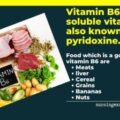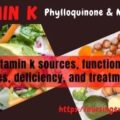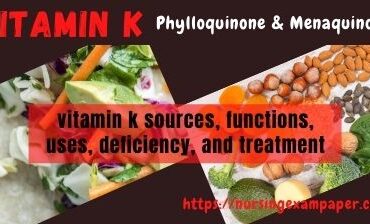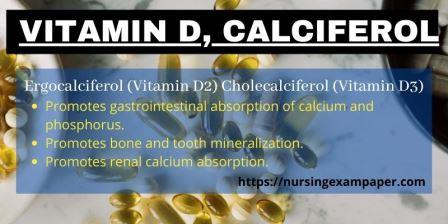Vitamin B3 is an important vitamin of the Vitamin B complex. it is also known as niacin and nicotinic acid. Niacin is an organic compound and is an essential nutrient of human food. Vitamin B3 is a water-soluble vitamin so our body can’t store it. niacin vitamin B3 is used for the treatment of high blood pressure.
Niacin can help lower cholesterol boost brain function and also in arthritis.
If we take a large dose of nicotinic acid it can cause a serious side effect.
Niacin vitamin B3 found in two main chemical forms.
Nicotinic acid- this form of niacin used to reduce cholesterol and reducing the risk of heart disease.
Niacinamide or nicotinamide- this form of niacin can treat Psoriasis and decrease the risk of non-Melanoma skin cancer.
Sources of vitamin B3
Our body gets vitamin B3 from foods, and the body also makes a small amount from the amino acid tryptophan.
Niacin rich foods are
- Meet, mostly red meat and liver
- Oily fish- Mackerel, Salman, etc.
- Poetry
- Eggs
- Milk and dairy products
- Bread fortified breakfast
- Peanuts
- Wheat, Maize
- Avocado
- Potatoes
- Plant milk
- Etc.
Vitamin B3 is also available in a supplement. Tablets, capsules, powders, and injections are available at a chemist shop for sale over the counter but should be used only with medical advice. Otherwise, it can prove to be harmful rather than beneficial. Some vitamin products are available here.
Niacin benefits and Function
Niacin helps us to keep our skin and nervous system healthy. niacin vitamin b3 has an important role in reducing fatigue and tiredness, niacin breakdown fats and proteins and converts our food into energy.
In the form of nicotinic acid, it helps in reducing LDL and helps in an increase in the level of HDL.
Niacin has an important role in producing a certain hormone in the adrenal glands. and also help in the removal of harmful chemicals from the liver.
Niacin also used in the treatment of headaches, migraine, circulation problems, dizziness, and reduce diarrhea.
In the form of nicotinamide, it is given to cancer patients because it reduces non-Melanoma skin cancer.
Naicin recommended dietary allowance (RDA)
- Children – 2 to 16 mg per day (according to age group).
- 0 to 6m – 2mg.
- 7 to 12m – 4mg.
- 1 to 3year – 6mg.
- 4 to 8year – 8mg.
- 9 to 13year – 12 mg.
- 14 to 18year – 16 mg.
- Men up to 16 mg/day.
- Women up to 14 mg/day.
- Pregnant women up to 18 mg/day.
- Breastfeeding women up to 17 mg/day.
Niacin Deficiency
Pellagra is a deficiency disease of niacin. it included symptoms like inflammation of the skin, vomiting, diarrhea, headache, fatigue, and memory loss.
Overdose risk and complication of vitamin B3 –
Niacin can cause Stomach problems like ulcer, liver problems, changes to Glucose level, and heart rhythm changes.
And another Side effect of niacin like-
Nausea and vomiting
Skin flushing combined with dizziness
Severe allergic reaction
light-headedness skin rashes
itching and stomach pain.
Which foods contain niacin?
Here is a list of some niacin rich foods. like
Meet, mostly red meat and liver Oily fish- Mackerel, Salman, etc.
Poetry Eggs Milk and dairy products, Bread fortified breakfast
Peanuts etc….
What is the recommended daily allowance of niacin?
Children – 2 to 16 mg per day (according to age group).
0 to 6m – 2mg.
7 to 12m – 4mg.
1 to 3year – 6mg…
Does niacin give you energy?
By the help of Niacin body breakdown fats, carbohydrates, proteins and converts our food into energy. Some studies prove that Niacin can help lower cholesterol boost brain function and also in arthritis.
What happens if you take too much niacin vitamin B3?
overdose of Niacin can cause Stomach problems like ulcer, liver problems, changes to Glucose level, and heart rhythm changes.
And another Side effect of niacin like-








